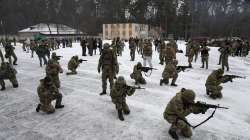Russia-Ukraine conflict: Moscow sends long-range nuclear-capable bombers on patrol over Belarus
The Russian Defense Ministry said that the two Tu-22M3 bombers practiced interaction with the Belarusian air force and air defense assets during a four-hour mission. The flight followed several similar patrols over Belarus, which borders Ukraine to the north.

Russia on Saturday sent a pair of long-range nuclear-capable bombers on patrol over its ally Belarus amid spiraling tensions over Ukraine.
The Russian Defense Ministry said that the two Tu-22M3 bombers practiced interaction with the Belarusian air force and air defense assets during a four-hour mission. The flight followed several similar patrols over Belarus, which borders Ukraine to the north.
The mission came as the Kremlin has moved troops from Siberia and the Far East to Belarus for sweeping joint drills. The deployment added to the Russian military buildup near Ukraine, fueling Western fears of a possible invasion.
Russia has denied plans of attacking its neighbor Ukraine, but urged the U.S. and its allies to provide a binding pledge that they don't accept Ukraine into NATO or deploy offensive weapons and roll back the alliance deployments to Eastern Europe. Washington and NATO have rejected the demands
The West has called on Russia to pull back an estimated 100,000 troops from areas near Ukraine, but the Kremlin has responded by saying it will station troops wherever it needs to on the Russian territory. As the tensions over Ukraine soared, the Russian military has launched a series of war games spreading from the Arctic to the Black Sea.
The Russian troop deployment to Belarus raised concerns in the West that Moscow could stage an attack on Ukraine from the north. The Ukrainian capital is just 75 kilometers (50 miles) from the border with Belarus.
In recent months, Russia has conducted a series of joint drills with Belarus and repeatedly sent its nuclear-capable long-range bombers to patrol the skies over its neighbor, which borders NATO members Poland, Lithuania and Latvia.
Belarus’ authoritarian leader Alexander Lukashenko, who has increasingly relied on the Kremlin’s political and financial support amid bruising Western sanctions triggered by his crackdown on domestic protests, has called for closer defense ties with Moscow and recently offered to host Russian nuclear weapons.
Also Read | Russia-Ukraine conflict: What Moscow wants, the West's interests | EXPLAINED
As war fears mounted, Ukrainian authorities launched a series of drills for civilians to prepare for a possible Russian invasion.
“I am here to learn how to defend myself, defend my relatives and also understand how to act in the situation," Kyiv resident Ilya Goncharov said after taking part in drills on the outskirts of the Ukrainian capital. “I am happy that I came here to learn the basics of self defense and first aid.”
Amid the standoff over Ukraine, U.S. President Joe Biden has ordered 2,000 U.S.-based troops to Poland and Germany and shifted 1,000 more from Germany to Romania in a show of the U.S. commitment to NATO’s eastern flank.
Earlier this week, Russian President Vladimir Putin has signaled Moscow's readiness for more talks with Washington and its NATO allies. As part of high-level diplomacy to ease the tensions, French President Emmanuel Macron is set to head to Moscow and Kyiv on Monday and Tuesday, while German Chancellor Olaf Scholz will travel to Kyiv and Moscow on Feb. 14-15.
Amid the tensions with the West, Putin on Friday attended the opening of the Winter Olympics in Beijing and met with China's leader Xi Jinping to strengthen the two countries' alliance. In a joint statement, Putin and Xi declared their opposition to any expansion of NATO while affirming that the island of Taiwan is a part of China.
Putin and Xi announced that the relations between Moscow and Beijing are “superior to political and military alliances of the Cold War era" and their friendship “has no limits.”
Also Read | Russia-Ukraine crisis: What to know amid the fears of a war
Also Read | Russia-Ukraine conflict: NATO outlines 'deterrence' plan as tensions with Moscow soar